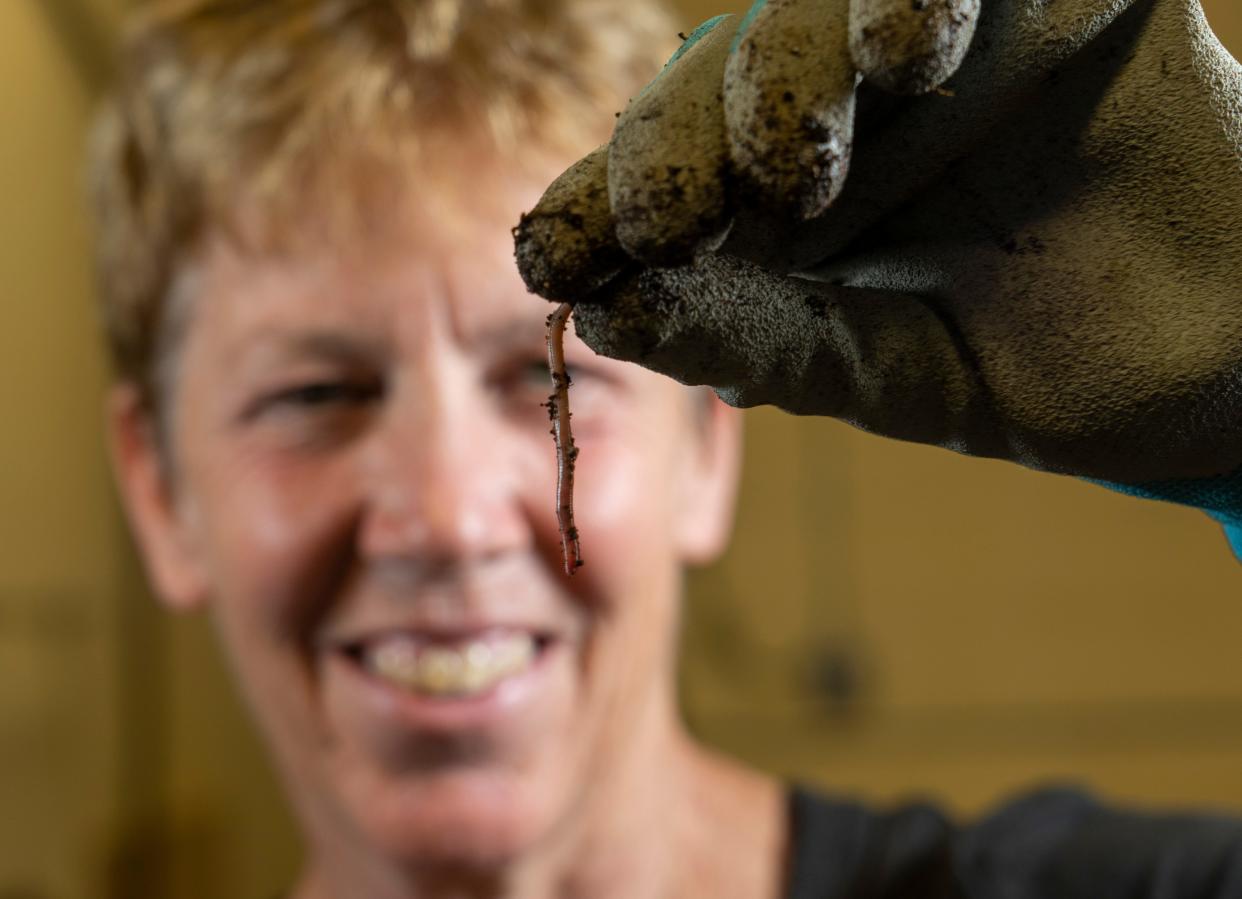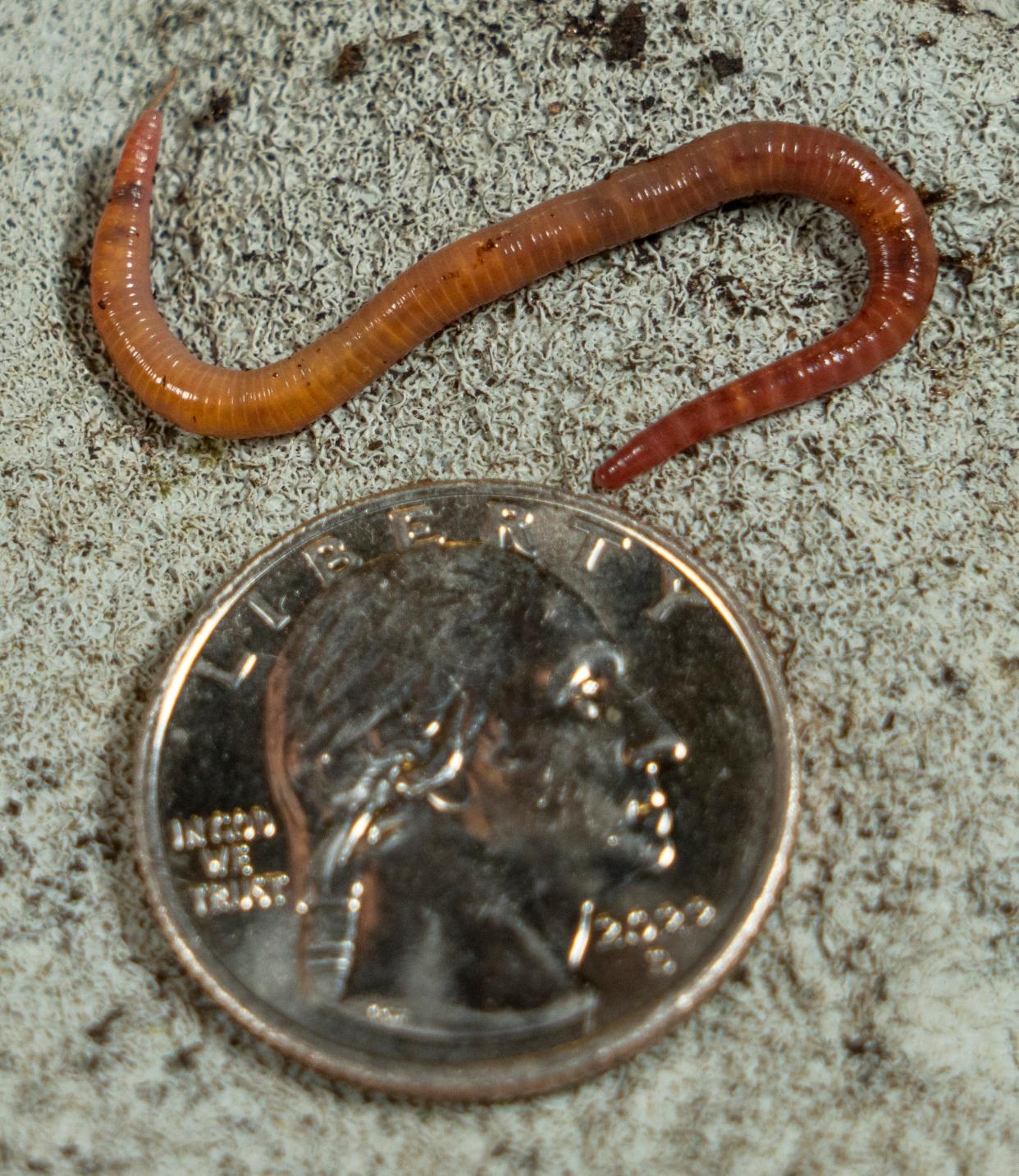Garbage or gold? Composting companies help people turn food scraps into natural fertilizer

Landfill space is a precious and possibly finite commodity in an urban area.
The Orchard Ridge Landfill in Menomonee Falls, the largest in the state, was close to capacity in 2019 with a pile of waste nearly 16 stories high. It expanded its footprint by 40 acres, and now has plans for more capacity.
Nationally, about 108 billion pounds of food — equaling 130 billion meals and more than $408 billion worth of food — are wasted each year in the United States, according to Feeding America.
In Wisconsin, the Department of Natural Resources studied state landfills last year and found that more than 30% of the waste thrown away is made up of food that is or was edible, along with food scraps, peels, bones and coffee grounds.
Understandably, most residential areas are not interested in having mountains of waste in their neighborhood. But with the average Wisconsinite throwing away 4.7 pounds of trash a day, all that waste needs to go somewhere.
Well, not all that waste. Much of it is compostable.
For many, the idea of composting comes with notions of smelly piles and backyard pests. A properly maintained compost pile is possible, but for many people, it’s not practical. Those who live in apartment buildings and condominiums are unlikely to have room for home gardens, and many don’t have the need for organic fertilizer.
But that doesn't mean they can't compost.
“Focusing efforts to reduce organic wastes can make a significant difference in Wisconsin’s waste stream and the environment," Casey Lamensky, the DNR solid waste coordinator, told the Journal Sentinel last year. "In addition to taking up valuable landfill space, landfilling these materials contributes heavily to the production of methane, a greenhouse gas 28 times more powerful than carbon dioxide if released into the atmosphere.”
In southeast Wisconsin, small businesses like Compost Crusaders, Curby’s Compost, Brew City Compost and the University of Wisconsin-Milwaukee's Panther Pails program have made composting easy.
They use slightly different models, but all work by subscription: They provide composting buckets or bins and pickup services so that customers only have to divert acceptable food waste into the pail, and the rest is done for them. The different operations have different rules for what can and cannot be composted.
With so much food waste taking up space in landfills and polluting the air, a robust composting program can divert thousands of pounds of waste from a landfill each year, said Melissa Tashjian, founder of Compost Crusaders.
The point is to get rid of waste, to transform it into a usable outcome.
More: Everything you need to know about composting, from bins to benefits

Curby's makes composting cost-effective
Composting is good for the environment, but there's also a financial incentive. It can save individuals and municipalities money and be profitable. Curby’s Compost owner Susan Bonucci saw that there was money to be made in composting.
Curby’s is a vermicomposter, meaning it uses worms to convert food scraps into castings that are sold as organic fertilizer. What makes this process unique is how clean and efficient it is.
At its Port Washington site, Curby’s uses a proprietary process to grind and press the compost it collects to remove moisture. Within 24 hours of collection, the waste is reduced to about one-tenth of its weight, Bonucci said. The worms eat the resulting product and excrete castings, which are nutrient-rich and help stabilize soil. They are sometimes referred to as black gold.
“What I wanted to do is create something that could be in a small urban area, without the smell, without the pests, that would be efficient and that would create a high value. Castings have a higher value. Our byproduct is worth more,” she said.
In addition to Curby’s, Bonucci owns a sister business, Dirty Dirt soil company. There she sells the castings, making Curby’s not just environmentally friendly, but ultimately a successful business.
“I became intrigued by figuring out if there was a way to make taking things out of a landfill that would be profitable so that there would be economic gain to the community for composting.
"That apple core you throw in the trash dies in the landfill. There’s no other market for it at that point. But if you take that same apple core and you put it in a compost bucket, now it's going into another marketplace,” Bonucci said.
“We can create economic gains for our community. We can create jobs for our community. We can create other marketplaces for our community. And we can also use it as a way to address some of the issues in our community. Throwing that apple core in the compost can really change our community.”
For each 5-gallon pail that Curby’s customers turn in, they receive $1.50 in soil credits. They can use those credits to buy soil or fertilizer from Bonucci if they choose. But customers who do not garden can donate those soil credits to programs working in the community on issues such as food insecurity.

Shorewood, Wauwatosa offer composting
Both Shorewood and Wauwatosa offer composting services in conjunction with Compost Crusaders.
Ann McCullough McKaig, Shorewood village president, now composts because the Shorewood Conservation Committee pitched the idea of a compost program to the Village Board. Partnering with Compost Crusaders makes it easy and manageable.
The Shorewood program allows neighbors to “share” collection carts, expanding the program and making it more accessible. At other people's homes, McKaig finds she feels strange throwing away items that she knows she’d compost at her own residence.
“It has really changed the way I think about waste,” she said.
A shift in mindset about all types of trash is common once people start composting, Tashjian said, even in the restaurants Compost Crusaders serves.
“We found that composting also helped implement just an overall more conscious behavior and habit of proper source separation,” Tashjian said.
Composting in Wauwatosa also is through Compost Crusaders, which offers a discount for referrals. Having a number of pickups in one neighborhood is good for a number of reasons, Tashjian said, but principally because it lessens the carbon footprint of her truck picking up compost.
Compost Crusaders also takes some of the more complex food waste from UWM. Coffee grounds, fruit and vegetable scraps and egg shells are collected by the university's Office of Sustainability through its Panther Pails program.
Anyone living on or off campus can sign up for a pail to fill with food scraps and drop it off at the Sandburg Garden Hoop House, where UWM students maintain a compost pile that nourishes on-campus gardens.
For other area residents, Compost Crusaders' costs run $15 to $23 a month.
Brew City Compost in Brookfield serves a number of Waukesha County communities, with biweekly residential pickups and on-site processing. It also collects food waste from businesses and sells compost. Brew City's website lists a cost of $20 a month.
Brew City recently began serving two area schools, Arrowhead High School and University Lake School, too.

A struggle to expand composting
Compost Crusaders does not process compost in part because it lacks the land to do so but collects it and delivers it to Blue Ribbon Organics in Racine, which processes it.
For Compost Crusaders, demand is outpacing the ability to meet it. The company has a waiting list for new customers and recently reduced a route because of staffing shortages.
Also, a City of Milwaukee composting pilot program that diverted more than 600 tons of waste was canceled in September 2020, just seven months after the city called for proposals to expand the program. The decision baffled Tashjian, who worked with the city on the pilot and knew the community interest in taking part.
What she and the other small composting businesses can accomplish is minor compared to the environmental impact the City of Milwaukee could have, according to Tashjian.
“What the compost industry needs to succeed already exists out there. We just need access to it. If we had some of the infrastructure ability that municipalities have at their disposal, we would be able to figure out a lot of pieces of the puzzle on our own,” Tashjian said.
“Wisconsin leadership is just really failing to make the connection between climate change and composting and, even more, so clean water and composting. … I don't see that there's any one right way to do it. I think it just needs to be done.”
Earlier versions of this report gave an incorrect cost for Compost Crusaders' service.
Our subscribers make this reporting possible. Please consider supporting local journalism by subscribing to the Journal Sentinel at jsonline.com/deal.
DOWNLOAD THE APP: Get the latest news, sports and more
This article originally appeared on Milwaukee Journal Sentinel: Composting companies help turn food scraps into natural fertilizer
